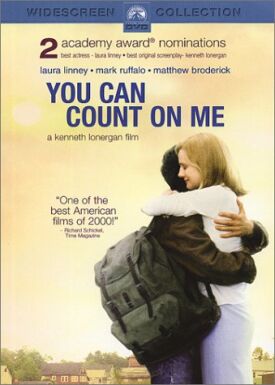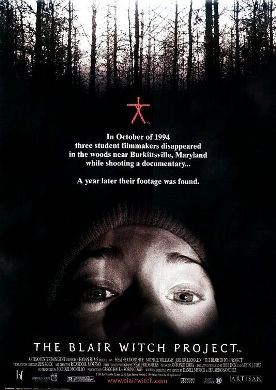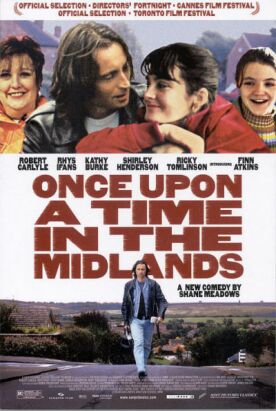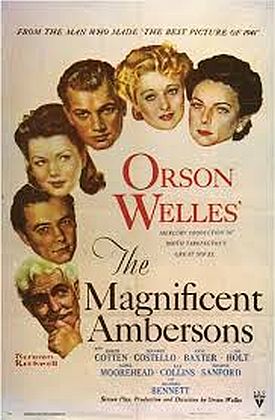You Can Count on Me
A husband and wife are driving home after an evening out. The wife asks the husband why it should be that they put braces on girls just at the moment when they are most self-conscious about their appearance. The husband, looking tired and fed-up, says he doesn’t know and lapses into silence. Suddenly there are the classic movie signals of an accident: headlights dead ahead and a horn blasting. Cut to a police officer knocking at the door of a big old house in upstate New York and inviting the baby sitter to come outside for a moment. The boy and girl in the house, watching TV, tease her that she is going out for a smoke. But we know why she is going out. As she does so, we are left with a long shot through the screen door of the kids still happily enjoying the TV show.
That’s all there is of the accident that orphans the two children whose adult lives are the subject of Kenneth Lonergan’s You Can Count on Me. It’s a nicely understated way to begin and ought to have been an example to Don Roos’s Bounce, which opened in my neighborhood the same weekend, of how not to milk a scene-setting tragedy. Throughout its two hours, You Can Count on Me wisely keeps the accident as far in the background as possible. In fact, the now-grown children, Sammy (Laura Linney) and Terry (Mark Ruffalo) Prescott, whom we meet some 20 years later but, in movie time, immediately after the baby-sitter steps outside, almost never mention their parents’ accident. The childhood habit of “counting on” each other in coming to terms with their grief is only alluded to at their parting, when Terry says: “Remember when we were kids, what we used to say to each other?” She does, and Lonergan rightly thinks it unnecessary for him to repeat it.
This may be one reason why one of my fellow audience-members at the screening I saw could be heard to say: “Well, that was real, not your typical Hollywood crap.” I don’t know if I’d go so far as to say that, but it is a likeable little film because Sammy and Terry are both flawed but likeable characters, as is the soulful eight-year-old Rudy (Rory Culkin), of whom Sammy is the single mother when she is not working as a senior loan officer in the local, Scottsville, N.Y., branch of a regional bank. Rudy Senior “isn’t on the scene,” says Sammy coyly to her new branch manager, Brian (Matthew Broderick), whose fussiness about the rules leads him to tell her that she can no longer duck out for a few minutes each afternoon to pick up Rudy after school and take him to his baby-sitter.
The first time we are introduced to Terry, he is saying to a girlfriend that “I’m not the kind of guy that everyone says I am.” Of course, this almost certainly means that he is the kind of guy that everyone says he is. At any rate, we swiftly learn that he is a ne’er-do-well and drifter, an inveterate pot-smoker, and that he has to borrow money from both the girlfriend and his sister. Yet when he suddenly reappears in Sammy’s life after years of wandering, she is delighted, which helps to establish in our minds the strength of the bond between the two of them just as it is about to be seriously frayed by the frictions between them when they attempt to live together in their parents’ house.
The problems start when Terry confides that he has been out of touch for so long because he has been doing time in Florida for his part in a bar-room brawl. He hadn’t wanted her to worry about him, he says. When Sammy tries to impress him with her disappointment in him he decries her habitual use of “this ‘you’ve-let-me-down’ bulls***” — as if, when he was in a redneck bar in Florida and got into a fight with a stripper’s boyfriend, he had been thinking: “I can really stick it to Sammy and get put in the pen for a few months.” Obviously, manipulation of the younger brother by the older sister is something that is very much a part of their past. Yet Terry delights in telling young Rudy that his mother had been, in her day, much more wild than he. Sammy can only respond with a sour, “No comment.”
Rudy is naturally curious about and longs for his absent father, about whom his mother never speaks. He is obviously in the market for a male “role-model,” but Terry is, in Sammy’s view, pretty unsatisfactory in that respect. He is a casual laborer who drinks and smokes pot and lounges around the house playing video games much of the time, and he proves unreliable as a baby-sitter on more than one occasion. But Sammy herself has some trouble setting a proper example for her son. Finding herself the beneficiary of a proposal of marriage from an old boyfriend, Bob (Jon Tenney), suddenly come back into her life, she realizes that she is no longer sure of her feelings for him at the same time that she is unexpectedly attracted to the married and very annoying Brian. Both siblings seem more or less helpless in the grip of their foolish and self-destructive impulses.
At the climax of the film, Terry takes Rudy on a quest to meet his father, an encounter which ends in fisticuffs, arrest and embarrassment on all sides, while Sammy tries to break off her relationship with Brian without losing her job. Both situations are fraught with comedy as well as poignancy. Yet it seems to me that the real hero of the story is the town of Scottsville, a place Lonergan makes come alive for us both in its folksy communal and its straitening, constricting aspects. Sammy values it for the former, Terry despises it for the latter, but both are attached to it as to a dead parent. As he is leaving Terry says to his sister: “It’s really good to know that no matter where I am and no matter what kind of stupid s*** is happening to me, that you’re back at my home rooting for me.” That’s what home means, I guess.
Discover more from James Bowman
Subscribe to get the latest posts to your email.








